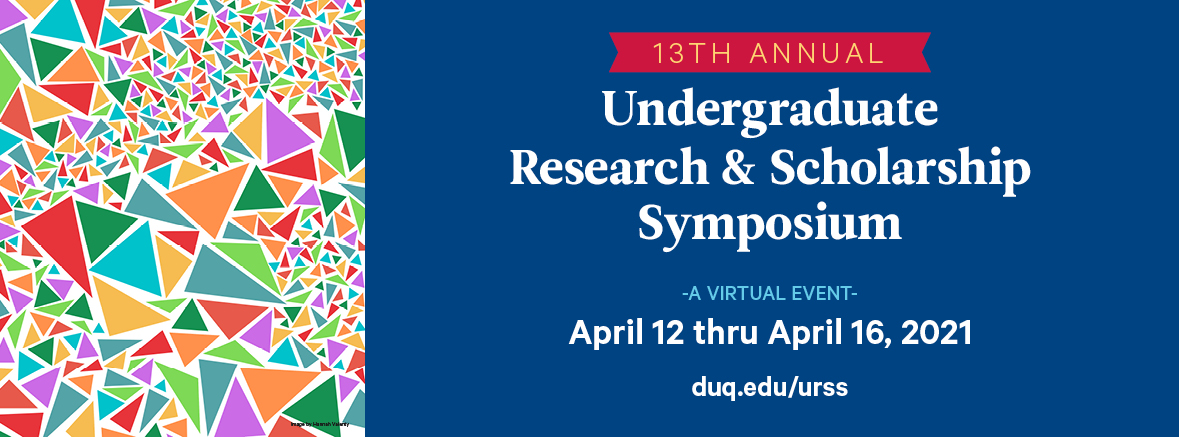Presenter Information
Author: Spencer McNeill - undergrad student B.S. Music Education at the Mary Pappert School of Music
Editor and Sponsor: Dr. Nicole Vilkner - professor of music theory at the Mary Pappert School of Music
Abstract
The Rusyns are a people indigenous to the Carpathian Mountains and its surrounding areas. Despite attempts by the Ukrainian government and surrounding nations to silently erase Rusyn culture from history, the Rusyn people have a distinct identity independent from that of any bordering nation. This unique identity is best outlined through Rusyn folk songs which depict pastoral images of the Carpathian homeland and patriotic tales of Rusyn ancestry. Much work to date has already been done documenting post Velvet Revolution revival of Rusyn culture. Because of this, I will instead focus on the lesser-known time prior and leading up to WWII and the Soviet bloc to highlight the slow practice of cultural repression of Rusyn folk culture by Czechoslovakia, Ukraine, the Soviet Union, and Hungary. I will dig up forgotten Rusyn folk songs from the 1919-1939 Czechoslovak occupation of the Carpathian Rus’ which assert Rusyn heritage in protest to the oppressive pro-Ukrainian regime. It was because of this period of cultural repression that many Rusyns left their homeland giving way to a vast Rusyn diaspora. Within my family’s reel to reel tapes, scrapbooks, and oral history, lie Rusyn folk songs and personal accounts I will connect to existing documentation to shed new light on published works. Sources used to explore unique Rusyn identity will include peer-reviewed collections of Carpatho-Rusyn scholarship, primary and secondary folk song collections, newly discovered audio recordings with sheet music transcriptions, as well as first-hand interviews with first- and second-generation immigrants.
School
Mary Pappert School of Music
Advisor
Dr. Nicole Vilkner
Submission Type
Paper
Publication Date
April 2021
The Cabbage Dance - 1967 children's secular song
Ja Pa Robicks - 1967 children's secular song.wav (14642 kB)
Ja Pa Robicks - 1967 children's secular song
Narodil sa Kristus Pan - 1967 christmas song - Veronica Matola.wav (35313 kB)
Narodil sa Kristus Pan - 1967 christmas song - Veronica Matola
Rosmaria - 1967 mens secular song.wav (15076 kB)
Rosmaria - 1967 mens secular song
Vincuem (Christmas Toast) - 1967 - Veronica Matola.wav (6557 kB)
Vincuem (Christmas Toast) - 1967 - Veronica Matola
Ya Rusyn Byl (I am Rusyn) - 1982 Kruzhok 1a.wav (41012 kB)
Ya Rusyn Byl (I am Rusyn) - 1982 Kruzhok 1a
Included in
Ethnic Studies Commons, Ethnomusicology Commons, European History Commons, Fine Arts Commons, Musicology Commons, Oral History Commons
JA RUSYN BYL (I am Rusyn): Household Folk Music as Resistance to Oppression
The Rusyns are a people indigenous to the Carpathian Mountains and its surrounding areas. Despite attempts by the Ukrainian government and surrounding nations to silently erase Rusyn culture from history, the Rusyn people have a distinct identity independent from that of any bordering nation. This unique identity is best outlined through Rusyn folk songs which depict pastoral images of the Carpathian homeland and patriotic tales of Rusyn ancestry. Much work to date has already been done documenting post Velvet Revolution revival of Rusyn culture. Because of this, I will instead focus on the lesser-known time prior and leading up to WWII and the Soviet bloc to highlight the slow practice of cultural repression of Rusyn folk culture by Czechoslovakia, Ukraine, the Soviet Union, and Hungary. I will dig up forgotten Rusyn folk songs from the 1919-1939 Czechoslovak occupation of the Carpathian Rus’ which assert Rusyn heritage in protest to the oppressive pro-Ukrainian regime. It was because of this period of cultural repression that many Rusyns left their homeland giving way to a vast Rusyn diaspora. Within my family’s reel to reel tapes, scrapbooks, and oral history, lie Rusyn folk songs and personal accounts I will connect to existing documentation to shed new light on published works. Sources used to explore unique Rusyn identity will include peer-reviewed collections of Carpatho-Rusyn scholarship, primary and secondary folk song collections, newly discovered audio recordings with sheet music transcriptions, as well as first-hand interviews with first- and second-generation immigrants.

